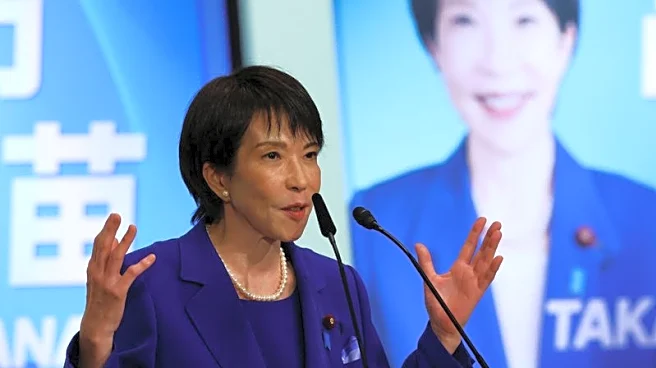SINGAPORE (Reuters) -Japan's ruling coalition broke up on Friday, with junior partner Komeito rebelling against the Liberal Democratic Party's new hardline leader Sanae Takaichi in a move that cast doubt over her premiership bid.
Market reaction was mixed as traders attempted to make sense of what the split meant for the political landscape and economic outlook.
The yen, which was trading near an eight-month low, strengthened as much as 0.5% to 152.38 per dollar after the fracture of the 26-year political
partnership. It was last at 152.73.
The yield on the two-year Japanese government bond (JGB), the tenor most sensitive to expectations for central bank rates, slid 2 basis points (bps) to 0.905%. The 30-year JGB yield jumped 5 bps to 3.225%.
Here are some comments from market analysts:
SHOKI OMORI, CHIEF DESK STRATEGIST, MIZUHO SECURITIES, TOKYO:
"If Takaichi cannot become PM, and say a fiscal austerity-style, pro-BOJ tightening candidate emerges from another party, unwinding of the 'Takaichi trade' would probably kick in. That's not the main scenario as opposition parties are not unified in their views, but the market may start to price in the 'risk' of a reversal. This would push USD/JPY back down. That said, the yen is likely to remain a funding/carry currency, so I don’t think USD/JPY will go down below 140 in the near term just on this."
BART WAKABAYASHI, BRANCH MANAGER, STATE STREET, TOKYO:
"Based on what Takaichi-san has been saying through her campaign, the yen was sold pretty aggressively ... the market will have to react if there doesn't seem to be a consensus to approve her as prime minister, as opposed to the very definitive market reaction that occurred when she was confirmed."
"This was some fuel to the fire, with expectations of a BOJ hike being kicked down the road a bit that added to the yen selling ... Takaichi-san isn't a supporter of hikes. Maybe there's some wiggle room there. The market largely expects the BOJ is doing nothing this month, I don't see that as a done deal."
NAKA MATSUZAWA, CHIEF MACRO STRATEGIST, NOMURA SECURITIES, TOKYO:
"The knee-jerk reaction is an unwinding of some of these Takaichi trades. There are basically two scenarios from here: The LDP retains a solo cabinet, or it can go for a coalition with the DPP. Part of the chatter about backdoor dealing was that Aso wanted to get rid of Komeito and bring in the DPP, because Aso is close with the DPP."
"In either of those scenarios, the Takaichi trades will be back, and maybe stronger than ever, because the DPP also supports fiscal expansion. If, for example, Tamaki became finance minister, that could really shock the market."
ALEX LOO, MACRO STRATEGIST, TD SECURITIES, SINGAPORE:
"The absence of a big JPY reaction probably reflects investors’ view that Takaichi would still be able to push her reflationary policies through the Diet eventually with the help of smaller opposition parties such as DPP."
"It’s still early days and Takaichi will engage with talks with Komeito again next week. We could see some concessions from both parties to reach an agreement given the LDP-Komeito long standing partnership."
KAZUNORI TATEBE, CHIEF STRATEGIST AT DAIWA ASSET MANAGEMENT, TOKYO:
"Japanese shares rose sharply after Takaichi’s win at the LDP election. The market priced in her policies into stocks, so if the market sees that she would struggle to carry out her plans, the shares will fall. But the decline is not significant, and they will probably fall around 1% to 2%.
"There are investors who were not able to catch up with the latest rally, so there is a demand for buying when the market falls, supported by non-political cues such as corporate governance, inflation and AI growth."
(Reporting by Kevin Buckland and Junko Fujita in Tokyo, Ankur Banerjee and Gregor Stuart Hunter in Singapore; Editing by Kate Mayberry)
















